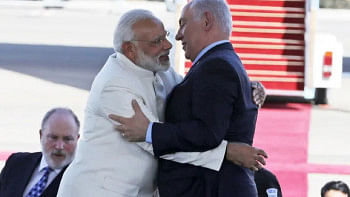EC content just by sending letters to home ministry
The Election Commission's measures to curb violence in the ongoing union parishad polls remain confined to only sending letters to the home ministry, asking for its help.
On May 8, a day after the fourth phase of the polls, the commission sent a letter to the ministry requesting that it take steps to ensure security to voters, especially minorities and women, and conduct drives against criminals and illegal arms before and during the next phase.
But the fifth phase, held May 28, was the deadliest so far, with 12 deaths and 200 injuries in one day.
After sending the letter, the commission, however, did not follow up about what extra measures the ministry would take, and it sent a similar letter with the same request yesterday.
About sending the same letter once again, EC's Secretary Sirazul Islam last evening told The Daily Star, “We want to remind them (ministry) of their duties during election. Their support is very important to maintain a congenial atmosphere to hold a peaceful election.
“We have asked them to conduct drives for arresting criminals and seizing illegal arms.”
Asked whether the EC has any special measure to curb violence in the next phase, he said, “We have taken sufficient security measures since the beginning. We consider all our measures special.”
Election to around 3,290 UPs was held in five phases from March 22 to May 28. At least 115 people were killed in violence over the polls.
Holding a press conference on May 26, civil society organisation SHUJAN claimed that the death toll and irregularities in the ongoing UP polls had broken all previous records in Bangladesh.
Previously the deadliest was the 1988 UP polls, when 80 lives were lost in violence.
On May 27, Ekattorer Ghatak Dalal Nirmul Committee visited the chief election commissioner and demanded effective steps to prevent attacks on minorities in polls.
Talking to The Daily Star yesterday, several election experts blamed indifference of the EC and lax enforcement of law for the massive violence.
“The commission should have played a strict role to check violence and irregularities since the start. But it did not,” said eminent election expert Dr Tofail Ahmed.
If the EC had thoroughly investigated violence and irregularities in the first phase and taken stern action, the next phases would have been less violent, he said.
“Besides, the EC should have absolute control over administration at the field during election. But some incidents have proved that the EC lacks control over the local administration,” Tofail viewed.
Abdul Alim, director of Election Working Group, a platform of 28 civil society organisations, said, as the EC did not play a strict role since the beginning, it was now very difficult to check violence in the sixth and last phase of the election on June 4.
Assessment of pre-election field situation, deployment of sufficient law enforcers, absolute control over local administration, dialogue with all stakeholders, and coordination with the press can play a significant role to reduce violence, he said.

 For all latest news, follow The Daily Star's Google News channel.
For all latest news, follow The Daily Star's Google News channel. 



Comments